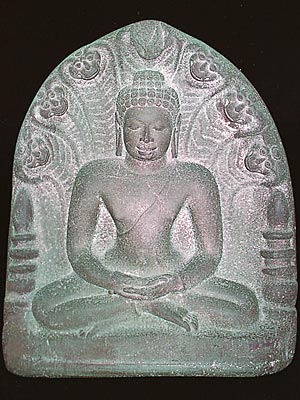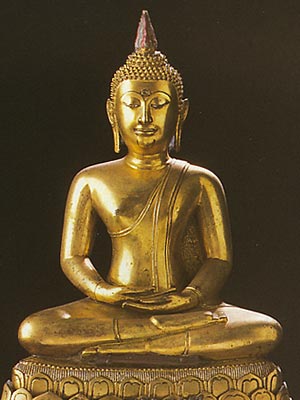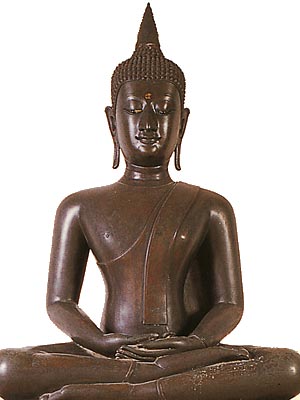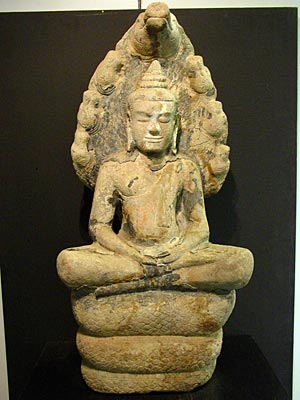Dhyana Mudra.
This mudra signifies meditation. Both hands are in the lap with palms upward. The right hand is on top of the left hand. The Buddha is most seated in the half-lotus posture (sometimes called 'yoga', 'Indian', 'Buddha' posture). Some images display the Buddha in the so-called adamantine (diamond, or full-lotus) posture with tightly crossed legs, so that the soles of both feet are visible.
The Bodhisattva makes a vow and is determined not the leave the spot (where he is sitting on the grass) until he achieves enlightenment. The Boddhisattva determines to find the cause of suffering and its cessation.

Found at Si Mahosot, Prachinburi province.
Now in the National Museum, Bangkok.

Sitting in the yoga posture. Note the right leg on top of the left, the right hand on top of the left hand.
Buddha image presently at Phra Pathom Chedi.

In the style of the Chiang Saen period.
Found at Chiang Saen, Chiang Rai province.
Image present in the cloister of the Ubosoth at Wat Benchamabophit, Bangkok.

Khmer art, Bayon Style (1177-1230 A.D.)
National Museum Prachinburi
![]() Characteristics and Postures of the Buddha
Characteristics and Postures of the Buddha
![]() Sitting Buddhas
Sitting Buddhas
![]() Reclining Buddhas
Reclining Buddhas
![]() Seven Days of the Buddha
Seven Days of the Buddha
Hand Gestures :
![]() The Six Main Mudras
The Six Main Mudras
![]() Dhyana Mudra
Dhyana Mudra
![]() Bhumisparsha Mudra
Bhumisparsha Mudra
![]() Abhaya Mudra
Abhaya Mudra
![]() Vitarka Mudra
Vitarka Mudra
![]() Varada Mudra
Varada Mudra
Historical Periods :
![]() Dvaravati
Dvaravati
![]() Khmer-Lopburi
Khmer-Lopburi
![]() Chiang Saen - Lanna
Chiang Saen - Lanna
![]() Sukhothai
Sukhothai
![]() U Thong
U Thong
![]() Ayutthaya
Ayutthaya
Historical Notes :
![]() Dvaravati
Dvaravati
![]() Sukhothai
Sukhothai
![]() Ayutthaya
Ayutthaya
![]() Resources
Resources
Temples in Thailand :
![]() Overview
Overview
![]() Wat Pho
Wat Pho
![]() Wat Benchamabophit
Wat Benchamabophit
Buddha Images at :
![]() Buddha Images at Wat Phra Pathom Chedi
Buddha Images at Wat Phra Pathom Chedi
![]() Introduction to Buddhism in Thailand
Introduction to Buddhism in Thailand
![]() The 10 Jatakas (lives of the Buddha) as depicted in Thai mural Temple paintings
The 10 Jatakas (lives of the Buddha) as depicted in Thai mural Temple paintings
More about Thailand at ThaiWebsites.com : Articles, and Web Directory
Content by Guido Vanhaleweyk, Bangkok.

.png)